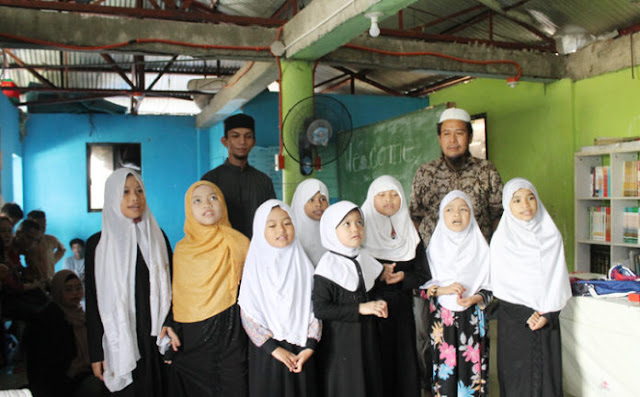A shelter for vulnerable Muslim children
By Ayunan G. Gunting
September 2, 2019
September 2, 2019
 |
| From left: Muadz Mauddin and Ustadz Abobacar Talib with the Muslim orphans |
METRO MANILA: The search for the Islamic Guidance Association Orphanage is like looking for a needle in a haystack. There are several Muslim neighborhoods in Taguig, all of which are difficult to navigate since many streets don’t have signage. The only landmarks are the mosques and halal-certified food stores. Ask around and the Muslims will say they have never heard of such orphanage.
On a Sunday afternoon, we hop from one barangay to another until we reach Lower Bicutan, which is a maze of little streets, lined with adobe houses and sari-sari stores. To get to the orphanage, we follow a guide on a motorcycle. He is a friend of the director, Ustadz Abobacar Talib.
Sans signage, the Islamic Guidance Association Orphanage is a three-story building with a façade of unpainted cement blocks. We climb the dark and narrow staircase to the third floor where 39 children are sitting quietly. The majority are girls, dressed in abayas (black cloaks) and hijabs (head scarves), while the boys are clad in tunics and slim pants.
The Islamic Guidance Association Orphanage is the largest establishment of its kind in the Philippines. As a home for orphaned and unprotected children, it provides care and guidance in a religiously sensitive manner. The children feel they belong to a family and have a sense of identity.
Talib, his brother-in-law Muadz Mauddin and Ustadz Manzur Al-Isahaq have dedicated themselves to this institution as volunteers. For them, caring for these children is a virtuous deed in Islam, following the example of Islamic founder, the Prophet Muhammad.
Talib has been a teacher all his life, starting in Maguindanao. He studied Arabic in Cotabato. In 2007, an official of the then New Horizon Integrated School (now Asian Academic Integrated School Inc.) in Pasig requested him to join the faculty and teach Arabic and Islamic studies. Meanwhile, he was also under the payroll of the Department of Education’s Arabic Language and Islamic Values Education (ALIVE) program, teaching Arabic in Madrasah (Muslim private schools that teach core values).
In 2008, a family friend was going to work as a domestic helper in Qatar. She requested Talib and his wife, Yusriya, to be the kafala, an Islamic tradition of guardianship, for her three children.
Consistent with the Shari’a law, the guardian should provide education in Islam and Arabic language. The experience gave the couple an idea of putting up a center for vulnerable children.
Talib started raising money to build the orphanage. He sought help from Arabs who owned recruitment agencies. Because money was difficult, it took Talib four years to put up a decent building. When the orphanage began operations in 2012, there were 14 children. Today there are 39 residents. On weekends, the children of single mothers come for eight-hour classes in Islamic ethics and etiquette, Quran reading and Arabic language.
Although the children have found a friendly environment, their living conditions are substandard. The children sleep in old foam mats. The girls are cramped on the second floor. The boys sleep on the third floor which also doubles as the classroom. The kitchen is found wanting in proper utensils and equipment. The bathrooms lack buckets of water to flush the toilets during the daily water interruptions. It is incongruous since Islam emphasizes physical cleanliness as a code of conduct.
A typical day starts before 4 am for their Fajr, the dawn prayer. Breakfast consists of egg, sardines, fish, noodles or chicken, depending on Talib’s budget. Fourteen of them are fetched by the bus to study at the Asian Academic Integrated School Inc. while the rest attend a public school. They bring biscuits for lunch and are given a modest allowance of P20 each.
In the evening they study the Quran for two hours.
The structured lifestyle has produced achievers. Fifteen-year-old Amir Cubon, a Muslim convert, won the national competition for adhan (the call for prayer) in 2017. “He came here without any knowledge of Arabic or Islam,” recalls Mauddin. “The center molded him well.”
Shara Simlail, an 11-year-old Tausug, won the national competition for Quran reading in Cebu. In both competitions, the contestants are judged for memorization of the Quran passages, perfect pronunciation, vocal clarity and stage presence.
Al-isahaq coached the contestants for two hours daily. Mauddin notes that the children’s lives have changed in the orphanage as they learn obedience, discipline and taqwa (love for God).
“They lived in a world where they were helpless. Here, their lives are guided according to Islamic beliefs,” he says.
Despite the small triumphs, the orphanage operations are far from its ideal. The finances are unstable. When the donations run out, Talib has to pay for the food expenses from his own meager salary.
Mauddin says the orphanage’s vision is to make the facilities homey, welcoming, hygienic and sustainable. “This is an unfinished project,” says Talib with a sigh. (Source: Business Mirror)



